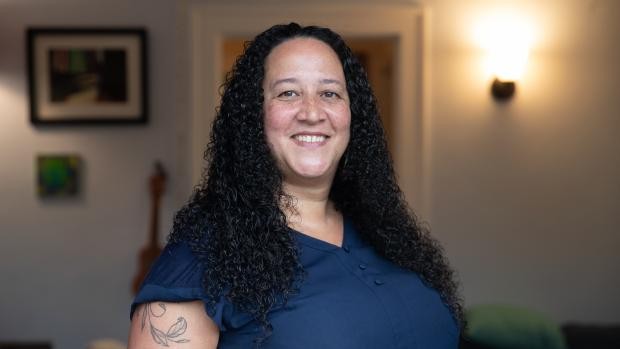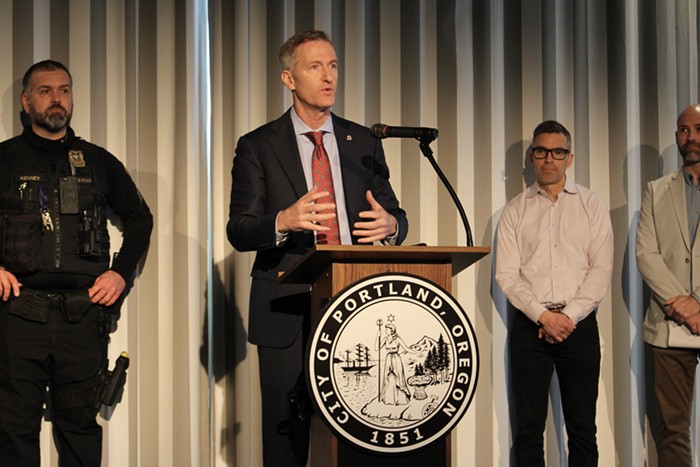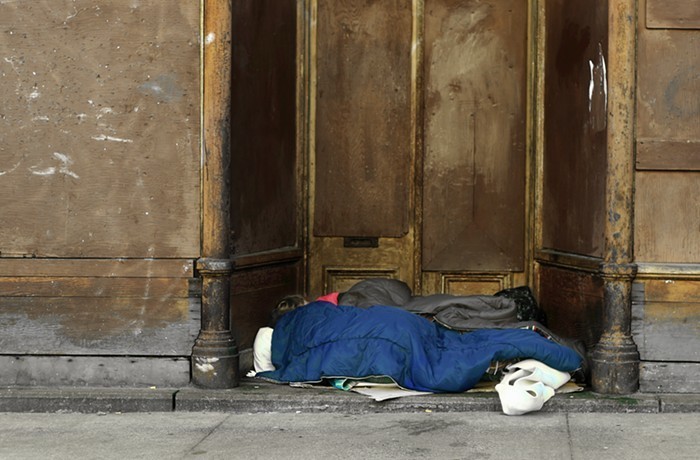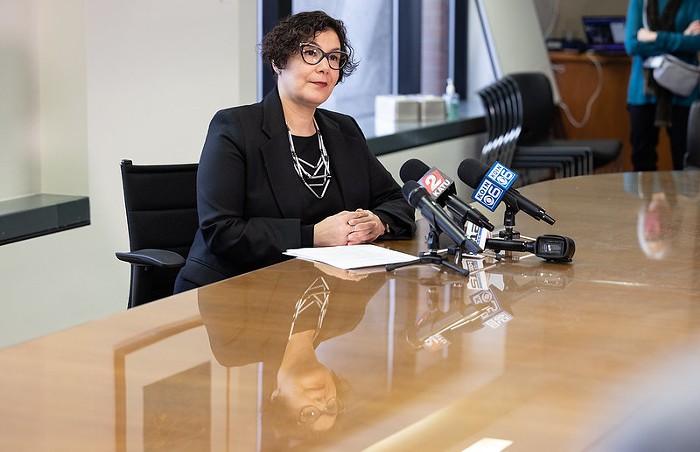Mayor Wheeler announced a much-anticipated proposal to ban homeless camping in Portland at a Friday press conference. This idea, which has been hinted at in various forms for more than a year, follows a growing drumbeat of vitriol from upset Portland property owners, businesses, and other members of the public about the impact that visible homeless camping has on the community—and its reputation.
“Simply put, we can no longer tolerate the intolerable,” said City Commissioner Dan Ryan, the city's housing commissioner who co-sponsored the proposal outlined by Wheeler on Friday. “It's time to take some risks to get our city out of this ditch.”
Yet, without the needed boost of significant funding, clear support from other government agencies, and interested contractors, the proposal appears little more than a plan to create an eventual plan.
The proposal is made up of five resolutions. Here’s what each attempts to accomplish:
1. Ban homeless camping on public property (i.e.: sidewalks, city parks, etc.) within 18 months of the city securing funding to create three large “designated camping sites” with space to hold at least 150 people. (If the city wants to increase this number, they'll need a council vote.)
2. Build 20,000 units of affordable housing within ten years—by 2033.
3. Support job creation programs to support low-income and unhoused Portlanders.
4. Create a diversion program in collaboration with Multnomah County District Attorney’s Office to offer alternatives to jail for homeless people penalized for living outside or other low-level violations.
5. Request funding from Multnomah County, Metro, the state, and federal agencies to support these plans.
Unlike previous policies that regulate homelessness that have come from Wheeler’s office this year, this plan is not an emergency declaration, meaning it will require a City Council vote to enact.
In February, Wheeler unveiled an emergency order prohibiting homeless camping along "high crash corridors," or streets known for frequent traffic fatalities. In August, the mayor’s office banned camping along streets deemed “Safe Routes to Schools”—routes identified by the city as safe walking and biking routes for students going to and from Portland schools. In each instance, Wheeler's bans came with a promise to offer threatened campers shelter space.
Wheeler acknowledged Friday that his previous attempts to move homeless people into shelters by enacting camping bans—and pushing for large campsite sweeps—haven’t worked to successfully clear Portland streets of visible homelessness.
"The fact is, for the past eight months we’ve increased alternative shelter options without a [citywide] ban, and to be completely transparent, it has not worked," said Wheeler. "While some people have gained access to services, it’s not the strategy that is going to work for us here in the city of Portland."
According to city data, homeless camp sweeps have increased by 2844 percent from September 2020 to September 2022.
Wheeler explained that the plan is, in part, informed by outreach workers who contract with the city to support homeless campers. Those workers expressed to his office that many homeless Portlanders living outside have asked for a space where they could legally set up a tent and not be threatened with a looming sweep.
Banning camping in public spaces, Wheeler added, allows the city to force homeless communities “closer to solutions than they need.”
"Criminalization is not the point," said Wheeler. "The intention here is to get people closer to treatment."
Ryan agreed, noting that banning homeless camping and re-directing people into outdoor camps will help "establish trust" between the city and its homeless population.
Ryan's support of the proposal lies in direct contrast with his previous pushback on a proposal from Wheeler's office to ban camping on downtown sidewalks and move unsheltered Portlanders into "high-population outdoor camping zones." Exactly a year ago, Ryan stressed to Wheeler that he would not support any outdoor campsites that house more than 60 people.
City Council will hold its first hearing on these resolutions on Thursday, October 27 and vote on the proposal the following Thursday, November 3.
The proposal has the tentative support of most city commissioners.
At a Friday morning press conference, Commissioner Mingus Mapps said he already plans on voting to pass all five resolutions. Commissioner Carmen Rubio said that the resolutions “set the stage for the real work and conversations ahead.” Commissioner Hardesty noted that her involvement in the morning’s press call was not meant to “endorse or oppose” the proposal, but “to express appreciation that there are multiple plans on the table with intriguing elements in them.”
In a media release sent after the press conference ended, Hardesty said that she hopes the upcoming council discussion on the resolutions will include more plans to strengthen renter protections, turn vacant hotels into shelters or short-term housing, and convert more unused pieces of city property into shelter space.
A previous version of this proposal, which was first leaked to Willamette Week last week, hinted at camps holding up to 500 people. The news sparked both backlash and support from homeless advocates and political candidates. In a televised debate that aired Wednesday evening, all three candidates for governor said they would support Wheeler’s plan—which they had already been briefed on. City Council candidate Rene Gonzalez also expressed support of the proposal earlier this week, prior to knowing the details of Wheeler’s plan.
Wheeler has yet to unveil where these new sanctioned campsites would be located, yet staff at several local government agencies say the mayor’s office is considering property currently owned by OMSI.
No local homeless service providers or shelter operators have offered to run these proposed camps.
And few, if any, of the region’s top shelter or homeless service providers said they were ever contacted by Wheeler’s office to give input on the proposal. Many told the Mercury earlier this week that they were surprised and blindsided by the news of his proposal.
Grant Swanson, a board member of Right 2 Dream Too (R2DToo), said a staff member in Commissioner Ryan’s office told him the city was “looking for input” on Wheeler’s proposal and offered to email Swanson a draft of the proposal late last week. He never received that email or a formal request for input.
“It definitely felt like an afterthought,” said Swanson.
Wheeler will be traveling to Los Angeles with City Hall staff next week to meet with an organization called Urban Alchemy that has allegedly expressed interest in operating the mass camps. Urban Alchemy, established in 2018, has worked in both San Francisco and LA to provide hygiene services to homeless populations, run shelters, and oversee sanctioned outdoor camps. While the California cities’ leadership has embraced the nonprofit, awarding the organization hefty contracts, the group has been met with criticism for acting as an arm of law enforcement by helping sweep homeless camps, and has faced labor complaints for workplace conditions.
The city has identified no funding sources to bankroll this costly package of proposals—nor has it released the estimated cost of operating these new camping sites. On Friday, Wheeler lobbied local and state lawmakers to support the proposal, urging Gov. Kate Brown to immediately enact a statewide emergency on homelessness to shore up state dollars and asking state and local lawmakers to pitch in resources.
Most of these proposals require cooperation with Multnomah County to move forward. There’s been no indication from current county leadership that the city will have it. Last Friday, Multnomah County Chair Deborah Kafoury rejected the idea that the city needed additional support from the county to expand support for homeless Portlanders.
“Multnomah County and the Joint Office have worked harder than anyone in this community to move people off the street and into stable, healthier homes. We’ve added more shelter beds in more locations, and created more responsive types of shelter, from motels to villages to behavioral health facilities,” wrote Kafoury in a statement sent to the Mercury on October 14. “And let’s also be clear: If the Mayor’s office wants to ‘clean up’ this city and enforce time, place, and manner laws, they don’t have to hide behind me or anyone else. They can just do it.”
On Friday, Wheeler said that if he didn’t push jurisdictions like the county for these resources, “I wouldn't be doing my job for the people of Portland.”
“I’m not here to make friends,” he added. “Nor am I here to make enemies. I'm here to face challenges head on and I hope you are too.”
Shortly after the Friday press conference, Kafoury said her office will be meeting with Wheeler’s staff next week to “continue the conversation.”
Kafoury’s term concludes at the end of 2022. The two candidates competing for her seat, County Commissioner Sharon Meieran and County Commissioner Jessica Vega Pederson, appear more open to discussing the plan.
After the Friday press conference, Vega Pederson said she shared the mayor's "urgent desire" to address homelessness and is committed to "partnering with the city toward the goal of ending unsanctioned camping and ensuring everyone has a safe place to sleep." Meieran said she "broadly agrees" with the plan, although pieces of it require more fleshing out.
"I am grateful to the Mayor for his multifaceted proposal to end the humanitarian crisis of unsheltered homelessness," said Meieran in a statement emailed to the Mercury.
According to Wheeler, people camping outside will not face criminal penalties until the proposed camps have been funded and built.
The mayors office has only briefly discussed establishing a jail diversion program for unhoused Portlanders with Multnomah County District Attorney Mike Schmidt. Schmidt expressed cautious support of Wheeler's plan Friday afternoon.
"I commend the City’s willingness to partner with the justice system to reduce barriers to housing, employment, and education while holding criminal offenders accountable," said Schmidt. "I look forward learning more about this proposal and the opportunity for collaboration that follows."
It’s worth noting that Portland already has a city policy that bans camping in public right-of-ways, which carries a $250 fine. The city has not used that policy for years, however, due to a number of legal restrictions.
Three years ago, in a case called Martin v. Boise, the Ninth Circuit Court of Appeals ruled that penalizing people for sleeping on public land amounts to cruel and unusual punishment if they have no place else to go. For cities in the Ninth Circuit, which includes Portland, that means that, as long as there are more homeless individuals in their city than the number of available shelter beds, then the city can’t prosecute people for sleeping outside.
It’s not yet clear if “dedicated camping sites” like the city is proposing can be considered indoor shelters options required under Martin.
Wheeler’s plan comes seven years after the city declared a “housing state of emergency.” The 2015 declaration eased zoning regulations for homeless shelters, expedited the permitting process for shelters, and established day storage facilities where unhoused people can safely store belongings. That declaration has been renewed by Wheeler every year since.
The plan also comes three years after the self-imposed deadline Wheeler gave himself after entering the mayor’s office in 2016 to create shelter space for every unsheltered person in Portland.
“I’d like to focus on programs that really move people from the streets and connect them either with families, or housing, or jobs, or whatever they need to effectively get off and stay off the streets,” Wheeler told reporters the morning after winning his May 2016 primary race. The number of unsheltered people in Multnomah County—3,057—has nearly doubled since Wheeler entered office.
The proposal, which city staff say has largely been penned by mayoral aide (and former Portland mayor) Sam Adams, carries echoes of previous solutions to penalize and solve homelessness in Portland. Expanding affordable housing units and increasing economic opportunity for homeless people were a central focus of the Portland City Council’s Ten-Year Plan to End Homelessness, created in 2004. And building a policy to remove homeless camping on city sidewalks was the focus of City Council’s 2010 rebranding of the so-called “sit-lie ordinance,” a proposal which failed to pass constitutional muster at both the city and state level. Adams worked in City Hall—as a mayoral staffer, city commissioner, and mayor—during the creation and rollout of these two programs.
The proposal also follows more than a year after the city began work on a more sophisticated version of sanctioned campsites: Safe Rest Villages. These villages, dubbed “SRVs,” were proposed to operate as sanctioned outdoor shelters for homeless Portlanders, complete with small shed-sized shelters, common areas, bathrooms, and on-site support services for their occupants. As of now, only one of the six proposed SRVs has opened. Momentum to open the other proposed SRVs has been delayed by issues securing contractors to oversee the villages and sustained opposition from neighborhood groups concerned about living near homeless people.
It’s not clear how Wheeler’s plan will avoid similar roadblocks. At the Friday press conference, both Ryan and Wheeler said they're confident that lessons learned from the SRV program will help them swiftly pass permitting hurdles to move forward. That is, if they receive enough funding or jurisdictional support to open these camps.




















